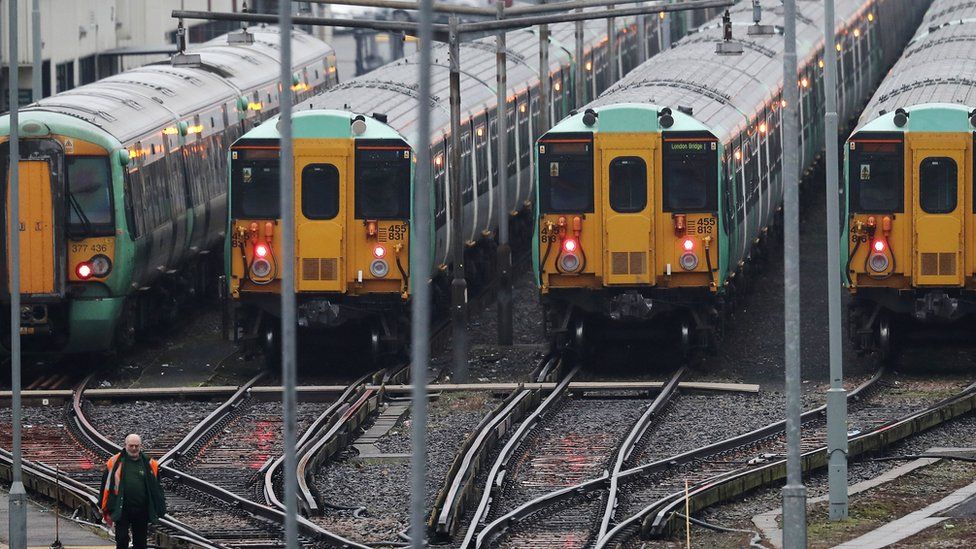Southern rail 'full service' to resume next week
- Published

Southern rail is to restore a "full train service" from next Tuesday after a union suspended industrial action, the rail firm has said.
The train drivers' union Aslef had been due to strike for three days next week but has called off the walkouts.
Southern said rosters had already been issued and it could not run a full timetable until 24 January.
Talks between Aslef and Southern earlier were described as constructive and will continue on Thursday.
Aslef's strike days had been planned for 24, 25 and 27 January but the union suspended the action if the company agreed to "engage in intensive talks".
Union officials are meeting Southern bosses under the joint chairmanship of TUC general secretary Frances O'Grady and Andy Meadows, HR director of rail firm Abellio.
'Dispute not over'
A spokeswoman for Aslef said next week's strikes could not now be reinstated if talks failed.
She said: "Once strikes have been called off, we can't put them back. We would have to look at other dates if the talks fail."
She also said the union was now awaiting the outcome of the latest discussions before commenting further.
Lewes MP Maria Caulfield said it had emerged that substantial progress had already been made in the talks and normal service will resume for the indefinite future.
But she said she would still lead an adjournment debate on Friday because this only solved Southern's immediate problems.
She added: "The normal Southern rail service is still inadequate."
The RMT also requested to join the talks, but for now its separate action for Monday is still on - the RMT has not yet commented on Southern's latest announcement.
Analysis: Richard Westcott, BBC transport correspondent
Everyone's making positive noises but don't kid yourself that this dispute is over.
It all comes down to the talks, and whether Southern is able to freshen up its offer and Aslef is prepared to cede some ground.
Relations between Southern and the unions had hit a new low....more EastEnders than Neighbours in recent months.
Hopefully, bringing in new blood to chair proceedings will take some of the heat out.
Neither side wants to lose such a high profile fight.
Meanwhile the RMT will carry on striking as normal. Their action doesn't have the same impact on services as Aslef's because it involves the conductors rather than the drivers, but it still causes problems.
Southern's parent company Govia Thameslink also needs to improve the way it works through engineering problems with Network Rail, and to increase the number of drivers it employs, to truly bring the service back to "normal".
Passenger services director Angie Doll said there would still be disruption next Monday.
But she said: "Due to the changes we've now fully rolled out, we're now able to run more services on more routes serving more passengers and ultimately we'll have fewer cancellations and delays."
'Futile action'
She said an extra 200 trains would run next Monday - the same day as a conductors' strike by the RMT union.
"The RMT should now recognise that their industrial action is wholly futile.
"They should stop the strikes, get back round the table with us and move forward together with us, delivering a better railway for our passengers."
Southern said it would run more than 70% of its trains next Monday - 10% more of its normal timetable than it operated on previous conductor strike days.
The company said this followed the completion of its programme to put drivers in sole control of the operation of the train, including closing the doors on nearly 80% of routes, and the transfer of many conductors to a new on-board supervisor role focused exclusively on customer service.
The dispute with the two unions has centred on the changes to guards' roles on trains. Both unions had raised concerns over safety and potential job cuts.
- Published17 January 2017
- Published17 January 2017
- Published13 December 2016
- Published13 December 2016